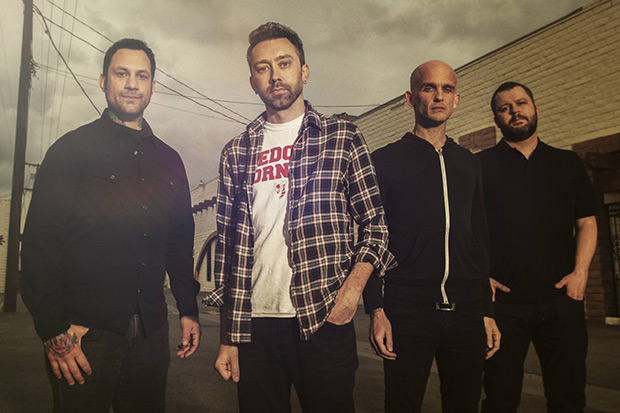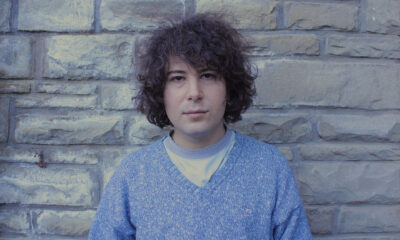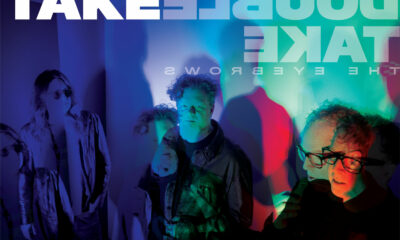Interviews
Interview with Rise Against drummer Brandon Barnes
Very few punk bands crack into the mainstream and even less of them do it with a political message. Chicago’s Rise Against have screamed for political activism and social responsibility since 1999, but it wasn’t until the release of their major label debut, Siren Song of the Counter Culture, that they did it on a mass scale. The album sold in excess of 500,000 copies and introduced their viewpoint and ideals to a whole new audience.

Very few punk bands crack into the mainstream and even less of them do it with a political message. Chicago’s Rise Against have screamed for political activism and social responsibility since 1999, but it wasn’t until the release of their major label debut, Siren Song of the Counter Culture, that they did it on a mass scale. The album sold in excess of 500,000 copies and introduced their viewpoint and ideals to a whole new audience. Now with the release of The Sufferer and the Witness, Rise Against has returned, determined to make their voices heard. PureGrainAudio caught up with drummer Brandon Barnes about the band’s current success, how he wants to be remembered and why he thinks everyone should think about how that hamburger got from the farm to their plate.
Rise Against has always been a very politically outspoken band and yet you’ve managed to break trough into the mainstream. Do you think that the messages you’re putting forth is going right over some people’s heads?
Brandon: I’m sure. Our fan base is such a wide range of people that think all different types of stuff, so I would imagine that the message goes over some people’s heads. I don’t think you’re ever going to connect with every person. I mean, some kids don’t even listen to the lyrics. I think that at every show if you connect with one kid, two kids or 300 kids, what’s important is you’re connecting with someone. I think one kid leaving that show changed or with a new idea is a great thing.
Do you think that it is possible for social change to occur though music?
Brandon: Yeah, I think so. I think music brings a lot of awareness to a lot of ideas and I think definitely.
There are people that say the opposite and they say that there’s been political music forever and it hasn’t done anything. There’s the close minded perception of things. How do you reach out to those people who are shutting you out before you are even plugged in?
Brandon: There seems to be people who are set in their ways and you can’t change it. Just the only way is to keep hitting them with the same message, but if they’re never going to change, then they’re never going to change.
Do you do anything different to combat the apathy that people have?
Brandon: Not really, you’re always going to have those guys. We do a lot of things with PETA and stuff and we always try to put things in our booth and you always have people come up and say they want to kick your ass. You can try to reel them in in a friendly way and just talk to them and explain to them you can do what you want and I can do what I want. There’s always going to be people that are set in their ways and that are close-minded and I don’t now how you go about affecting them.
The video for the track “Ready To Fall” features graphic scenes of animals being abused and murdered. Why did you choose to make such a heavy statement with a music video?
Brandon: It seemed like doing an important video with a message was more appealing than doing a typical video in an alley with a fire in a trashcan. I think kids watch this video and I think you have to be affected by it. You see those images and you have to stop and think. I was just happy to be part of a video with a message and just let kids know that human nature affects all living things.
Is it fulfilling to have something with such a strong message that still gets out there to the masses? This video has made quite a bit of news.
Brandon: It’s cool to be a part of a video that’s seen something other than your run of the mil video. We made one that was a little more graphic after we made the nicer one, or whatever you would call it. We did that because there was still some imagery that we wanted to touch on that might not have worked in the first one. It’s pretty cool.
Give us your best pitch for PETA and being a vegetarian, because there are some people who have never given much thought to animal cruelty or to eating meat…
Brandon: I think that if people were aware of how their little cheeseburger arrived on their plate, I think they would think twice about what they’re doing, because there are alternatives. You can find food in a lot of other ways other than torture. If you research it, it’s pretty horrific the things that they’re doing and most people just don’t know that because you don’t see it on TV. I don’t think that the meat market in the US is ever going to allow that and that’s the problem that people don’t know. You see these little kids walk past the PETA tent and see the “Meat is Murder” video and are like, “Oh god!”
On the other hand, you have a guy like Ted Nugent who says that it’s our nature to go out and hunt for food.
Brandon: To be honest, hunting down an animal and killing it for food, I’m way more open to that than the way the meat market treats their animals. I’m not saying I agree with it, but it’s way more understandable. The way the meat market goes about it, injecting all the drugs and keeping them in such tight quarters and unhealthy, it’s torture, you know? I think it’s a lot worse than a wild animal that you kill and eat.
Where did the title “The Sufferer and the Witness” originate from?
Brandon: Tim came up with the idea, because I guess the Iraqi war started hitting home with him. There are the sufferers and then there’s the witness. You can’t pretend like you don’t know what’s going on in the rest of the world. The media covers everything in such depth so if you sit down and just turn on the news, there’s no excuse to not knowing what’s going on somewhere else. Now everyone is the witness. It’s not like we don’t know what’s going on.
Since I’ve got the record, every time I listen to it, I get a new favorite song. Was that our intention when you wrote the record, to have a bunch of great songs that can stand alone?
Brandon: Not really, we never have a game plan when we write our record, we just sit around come up with some ideas and bring them to the table and choose the best 15 that we have. There is a lot of diversity on the record, it wasn’t really on purpose, and we’ve got four different people, four different styles. I’m really happy with the record I think it’s really diverse. There’s no secret as to what songs we do and what songs we don’t.
With this record, it seems like Tim’s really coming into his own as a singer. Would you say that that’s a fair assumption? He seems a lot more comfortable with his voice.
Brandon: Yeah, he’s gotten so much better. Versus could be choruses, the melody is just so strong. I think that’s a product of Bill too. When you’re recording with someone you’re comfortable with, I think you can get into it more and obviously Tim has grown as a singer, but I think you need to give Bill some credit for that as well.
The song “Roadside” is a little different for you guys. There’s also some female vocals in the background as well, who came up with that idea?
Brandon: That some is actually a guitar riff that Tim’s been playing and we tried to fit it into a song. He’s been playing it for a couple of years now. He kind of finally made it it’s own song after trying to fit it into other songs. He showed us that in the studio and we all thought it was really cool. The female vocalist, she’s from a band called Holy Roman Empire and they’re a band from Chicago. Her voice is really good. She came out for a few days in Colorado and those strings that you hear on it are actually 2 interns that work at Bill’s studio. We didn’t know if we were going to keep those strings, but they just put them down just in case and yeah, it’s definitely a different song for Rise Against.
The other song that peaked my interest was “Approaching the Curve”, because of the spoken word part in that track.
Brandon: That was the song that Joe came up with. We had drums and everything all worked out but Tim was kind of wrestling with a vocal melody to match it. He decided to read a short story that he had written a few years ago. It kind of reminded me of At the Drive-In type where he was kind of talking under the music. I left the studio to spend some time with my wife and came back and I heard that and I loved it. I fought to get that on the record the whole time and it made it so I’m very happy.
It’s definitely a different style for you guys.
Brandon: It is and the chorus is so strong. The whole verse, you’re leaning in trying to listen to the whole story and then the chorus comes out and it just hits you. I think it’s a really powerful song; it’s my favorite on the record.
With this record coming out, do you have any hopes or aspirations for this new record?
Brandon: I think this record will do well. The last record did really well. I always say this because it’s so true. As long as I can pay my bills playing drums at 27, I’m just so happy that I’m playing music and making a living doing it. Hopefully our next record will do better. I think it will do equally as well. I think it’s a stronger record and we have a great video for it, Out of the Box.
Siren’s already gold or it’s teetering gold, right?
Brandon: It’s teetering gold. It’s actually gold in Canada. It should be gold in a couple of months. We have 100 more to go.
Does that blow you away going from touring in a van more DIY to reaching gold?
Brandon: We still tour in a van, so we’re still a little DIY, we keep it real, but it does blow my mind. When I was little, hardcore bands, if you sold 3000 records, you were huge. To think about 400 000 records, I can’t even believe it. It’s also about how big the punk-rock scene has gotten, so yeah it’s a huge surprise.
You have bands like AFI who came out number 1 on the Billboard. You think back like 15 years ago and it wasn’t even a possibility.
Brandon: It’s amazing, AFI, we’ve done tours with them, we’ve known them for years and good for them, they’ve done great.
In the punk scene, there was a little bit of a controversy with kids calling bands “sellout”. Did that bother you when kids cried, “Sell-out”?
Brandon: You’re always going to have those kids. I’m still confused as to what “sell out” means. You have these punk labels and the kids calling you a sellout yet they’re wearing a Thrice t-shirt. I think kids get confused as to which bands are on majors and which aren’t. I think all these indie labels still have huge distribution, they’re not driving around in a minivan dropping their CDs off at Best Buy. Unfortunately, you have to use some told to get your record out, otherwise nobody will hear your record and we actually signed to Dreamworks, we didn’t sign to Geffen. We had major labels after us for a while and we were saying, “no, no, no” and we decided to go with Dreamworks because they seemed down to earth and really cool and they said that we could do what we want and we would have total control. Then they folded and we got pushed to Geffen, which was scary at first, but now we’ve learned that Geffen is great. They let us write the songs we want to write, obviously they let us make the video we wanted to make, they let us do what we want. As of right now, I have no complains. I think right now, selling out would have been changing our lyrics and making a teeny-bopper video and I think we stuck to our guns and have done the same thing we’ve done for six years. I don’t think that has anything to do with selling out.
When people look back to the history of music or punk rock, how do you want to be remembered?
Brandon: I wanna be remembered as a band that stuck to their guns and had a message and never really sold out that message. We worked our asses off, we toured 9 months out of the year, tried to get to all of our fans. I want to be remembered as a band with good ideals and a band that stuck to their guns and worked hard.
-

 Alternative/Rock8 hours ago
Alternative/Rock8 hours agoThe V13 Fix #010 w/ High on Fire, NOFX, My Dying Bride and more
-

 Hardcore/Punk7 days ago
Hardcore/Punk7 days agoHastings Beat Punks Kid Kapichi Vent Their Frustrations at Leeds Beckett University [Photos]
-

 Alternative/Rock6 days ago
Alternative/Rock6 days agoA Rejuvenated Dream State are ‘Still Dreaming’ as They Bounce Into Manchester YES [Photos]
-

 Culture1 week ago
Culture1 week agoCirque Du Soleil OVO Takes Leeds Fans on a Unique, Unforgettable Journey [Photos]
-

 Music1 day ago
Music1 day agoReclusive Producer Stumbleine Premieres Beat-Driven New Single “Cinderhaze”
-

 Indie1 week ago
Indie1 week agoMichele Ducci Premieres Bouncy New Single “You Lay the Path by Walking on it”
-

 Culture2 days ago
Culture2 days agoDan Carter & George Miller Chat Foodinati Live, Heavy Metal Charities and Pre-Gig Meals
-

 Alternative/Rock1 week ago
Alternative/Rock1 week agoWilliam Edward Thompson Premieres His Stripped-Down “Sleep Test” Music Video










